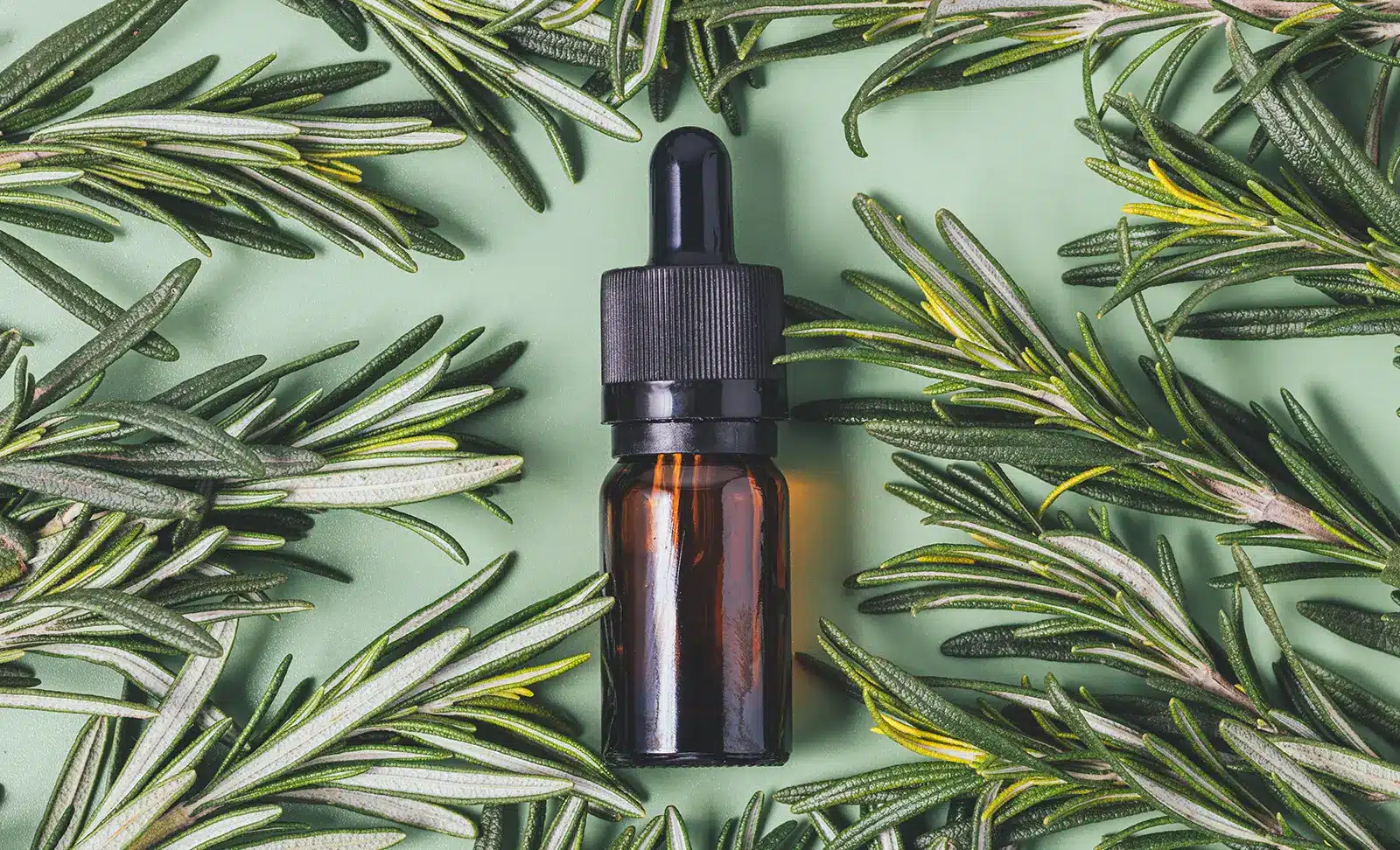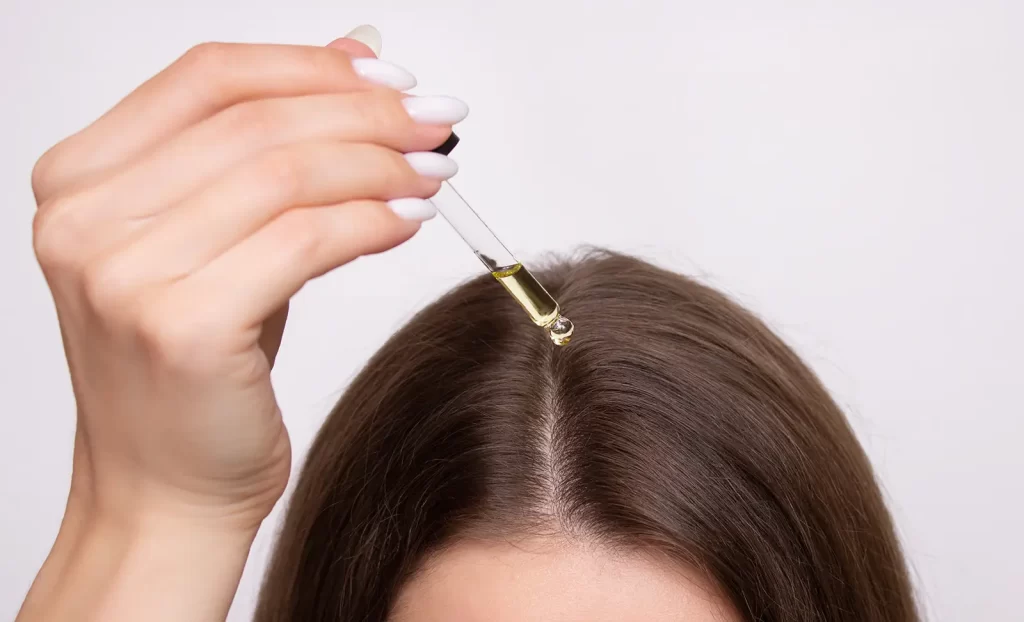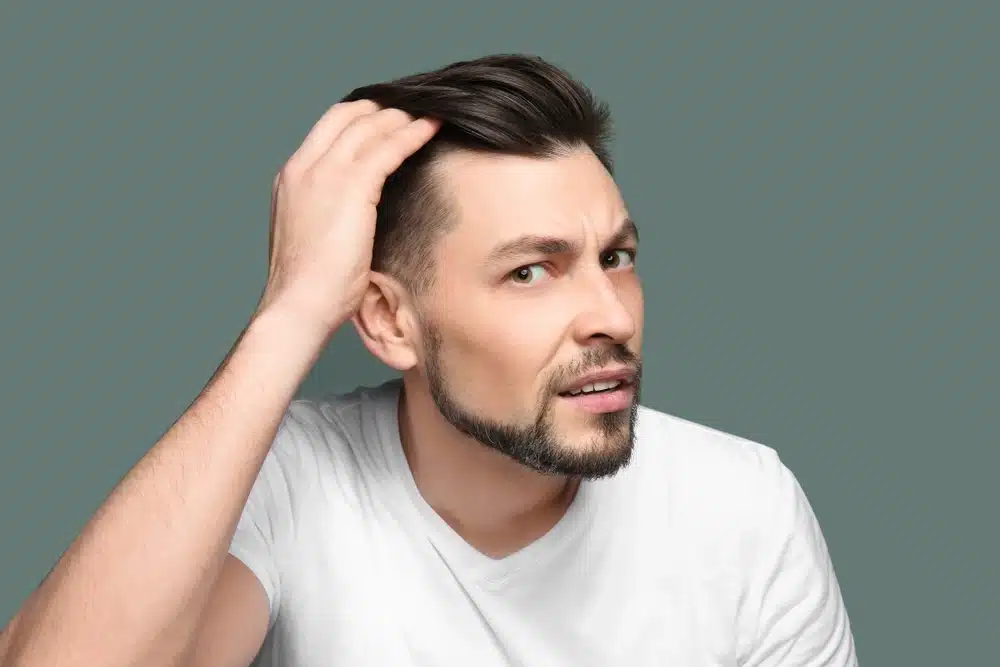Imagine a natural remedy that can make your hair grow. It seems too good to be true, but is it? For a long time now, rosemary oil has been used to help people look after their tresses, whether this is through adding protection to split ends or massaging it into the scalp to boost hair growth. In this article, you’ll find out if using it in such a way is worth your time and money, or if you should opt for an alternative hair loss treatment.
What’s Rosemary Oil?
Let’s start with the definition. Rosemary oil is made through quite a simple process: by taking rosemary springs and infusing them into an oil. In fact, many people even make it at home, as it requires just a few ingredients, some you may already have in your house.
Rosemary oil is used for a wide range of purposes in addition to hair growth. It can be used as a skincare product, to repel insects, for pain relief, and as an essential oil to improve the brain’s function. There’s no denying that people get a lot of use out of it!
Rosemary Oil for Hair: Does it Work?
Now, onto the real question here: does rosemary oil actually promote hair growth? One of the theories is that rosemary oil has anti inflammatory properties which can heal the scalp and increase blood flow. As a result, the hair follicles are more likely to rejuvenate and become capable of growing hair. It’s about creating the perfect environment for healthy hair. There have also been suggestions that rosemary oil can reduce the amount of dandruff on the scalp, which will naturally help your scalp to heal and, in turn, encourage hair growth.
Looking Into the Science
To see whether these statements are true, it’s best to look at some studies. One insightful study from 2015 aimed to show the effectiveness of rosemary oil compared to minoxidil when treating androgenetic alopecia. [1] One set of patients took rosemary oil for six months, while another set of patients used minoxidil 2% (a medication specifically made for hair growth). Both groups showed a boost in their hair count after the full six months, indicating that rosemary oil could be just as effective as minoxidil for treating hair loss.
Another way that rosemary oil may promote hair growth is by being a natural DHT blocker. In a 2013 study on mice, Rosmarinus officinalis leaf extract was used on the mice to help regrow the hair after testosterone treatment. [2] Like the 2015 study, the results were promising – the rosemary was able to inhibit the testosterone hormone, making rosemary a potentially effective ingredient in the treatment of hair loss.
That isn’t to say that rosemary oil is guaranteed to work for everyone who uses it – rather that studies have shown promising results, and the science backs it up. For people battling hair loss, it might be a product that could help.
How to Use Hair Oil for Hair Growth
If you want to use rosemary oil to boost hair growth or prevent hair loss, you should know how to do it correctly. Follow these steps to get the most out of rosemary oil.
Step 1: Apply Rosemary Oil Directly to the Scalp
First, apply the oil to the scalp. The type of rosemary oil you use is up to you. Some people use pure rosemary oil, but this may be too irritating for some people’s scalps, so they combine it with another carrier oil (such as argan oil) to dilute it a little.
Step 2: Massage the Oil into the Scalp
Next, you need to massage the oil into the scalp, which you can do with your fingertips. Massage slowly, creating a circular motion and ensuring that you cover all areas of the scalp. Any leftover oil can be brought down through to the ends of your hair to add a boost of hydration.
Step 3: Leave the Oil On
To allow the rosemary oil to work its magic, leave it on for at least a couple of hours. Ideally, you should leave it on overnight. If you do this, you’ll want to cover your hair with a cap or towel so the rosemary oil doesn’t get all over your pillow and ruin it!
Step 4: Wash the Rosemary Oil Out
Once you’ve allowed the rosemary oil to sit on your scalp (preferably overnight), it’s time to wash it out. You can do this with your regular shampoo in the shower or over the sink, shampooing twice to ensure you get all the oil out. Follow this up with your usual conditioner to lock in extra moisture. Then, you’re good to go!
The steps are really that simple. You can follow them two to three times a week for optimal results. While you can use it every single day, you don’t need to for hair loss. Plus, daily use could be too much for some sensitive scalps.
Potential Side Effects of Rosemary Oil for Hair
Most people don’t have any issues when using rosemary oil for hair, however, some people may experience an allergic reaction. In this case, it’s important to stop using it immediately. There’s even the possibility that rosemary hair oil could do the opposite and damage the hair follicles, causing the hair to fall out. To avoid this, most people only use rosemary oil a couple of times a week and dilute it with a carrier oil, especially if they have a sensitive scalp.
How Long Does It Take to See Results?
In the 2015 study we mentioned earlier, it showed that results weren’t visible for around six months, so you’ll need to be patient when using rosemary oil. After all, hair doesn’t grow overnight! Use it continuously for six months, and if you don’t see any results after around a year, it might be better to try an alternative hair loss treatment. You can even use a hair track app to keep up with hair growth.
What if You Don’t See Results?
What happens if rosemary oil for hair doesn’t work for you? In this case, it’s best to look at alternative options. While studies have shown that rosemary oil could be effective for hair loss, it doesn’t mean it’s the only option, nor that it will work for everyone. It could even have the opposite effect for some people, so it’s good to know what other hair restoration options are available.
Alternative Hair Restoration Methods
If rosemary oil for hair loss doesn’t work for you, or you want to try something with a little more scientific backing, there are alternatives. If you’ve experienced hair loss, these restoration methods may be a better route for your hair journey.
Minoxidil
Using minoxidil is a way to stimulate hair growth, with both men and women often seeing noticeable results from this topical medication. It’s one that you’ll need to use daily to keep up with results, and you can get it over the counter.
Finasteride
Finasteride is a medication that’s only for men. It can be prescribed by your doctor and is usually used to treat enlarged prostates, but its DHT-blocking abilities also mean that it’s a worthy medication to treat hair loss.
Low-Level Laser Therapy
A commonly recommended treatment for hair loss is low-level laser therapy, which is a treatment you can get in a clinic (although there are devices you can also use at home). It works by stimulating the blood flow, which in turn stimulates the follicles and encourages hair growth.
Other Hair Oils
It’s not only rosemary oil that’s cited as a hair-boosting oil – there are others! These include pumpkin seed oil, castor oil, argan oil, and jojoba oil. These are typically used in the same way as rosemary oil. However, keep in mind that some have more scientific proof of working than others.
A Hair Transplant
Medications and oils may not be enough for those with extensive hair loss, and this is where a hair transplant comes in. A hair transplant involves a surgical process where a surgeon extracts healthy hair follicles and places them into the area of the scalp experiencing balding. These follicles attach and begin growing hair in that area, resulting in full hair growth. It’s an excellent option for people with androgenetic alopecia, as the results will last forever.
Rosemary Oil Hair Growth: In Summary
Studies have shown that rosemary oil may be effective for hair growth, particularly when used over a long period. It’s certainly worth trying if you want your hair to grow or you’re experiencing thinning hair or bald patches. However, it doesn’t work on everyone, which is why knowing the alternatives (like minoxidil) is a good idea.
Are you ready to begin your hair restoration journey? Here at Harley Street Hair Clinic, we can help people to regain a full head of hair. If you’re interested in how we can help you, check out our patients gallery.
Sources:




